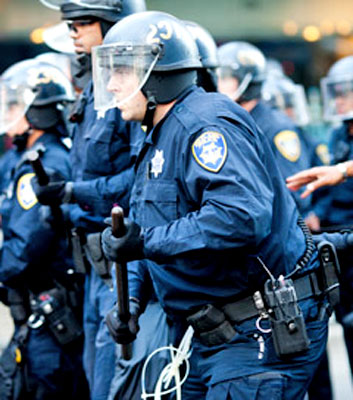|
by Antonia Darder
24 April 2011
As the uprisings are spreading around the world and in the United States, there are many who feel fear, reticence and intense skittishness about what is transpiring.
Yet, this anxiety, rather than surprising, is
well cultivated by the
contemporary hegemonic forces that govern our lives.
As much as U.S. rhetorics would like to pretend we are
a classless nation, such protests are forms of class struggle.
This causes even good
liberals to worry incessantly about the dangers of mass protests.
The result is a
reclaiming of humanity and public space - both well domesticated and
controlled under contemporary Western rule - when the people finally refuse
to permit the oppressive forces of injustice to be reasoned away or for
repressive public policies to press upon our souls one more moment, without
responding.
But we are also taught that to enter collectively
into this state of uprising is dangerous, for, in many instances, it may
result in violence with impunity by the state, in an effort to regain
control of public life.
So, in many ways, we can also think of uprisings that call for the ousting of government heads and officials as forms of "altruistic punishment," a term used by Stephen Hall to speak of a collectively loving act of faith by the people, rightly exercised with their,
In Western societies with a heavy cultural emphasis on dispassionate reason and unrelenting individualism, such values function to distort the inherent communality that even neuroscientists now conclude is actually hardwired in human beings for our collective survival.
However, Westerners, who often
have so much less to lose as compared to the people of Bahrain, for
instance, tend to be even more fearful of collective action, given their
deeply conditioned cultural belief that cool individual reason is superior
to passionate collective action. This misguided notion is reinforced by the
fact that mass action with stirred emotions is only considered legitimate in
the exercise of war, not democratic life.
Hence, it may not be easy for many to trust the uprisings in Wisconsin and around the world today, given deep, unexamined insecurities and fears, intensified by a lack of faith in the people and an accompanying anxiety that things could get or be worse.
That said, it should not be surprising
that the more disconnected a person or class may feel from the passion that
stirs the collective action of disenfranchised masses, the more concern they
are bound to express for their individual well-being.
What we should fear then is not the
uprising of the masses who call for justice, but the fearful reactionary and
violent responses of
the powerful when they realize that they cannot
effectively thwart the "altruistic punishment" of a people grown weary by
the impunity of political-economic oppression and a government's betrayal of
universal human rights.
|

